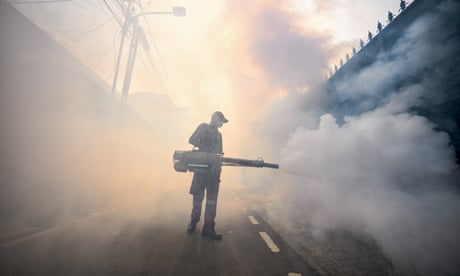WASHINGTON, Dec 12 (NNN-AGENCIES) — Deaths from dengue fever surged across the Caribbean and the Americas in 2024, health officials said, as warmer weather brought on by the climate crisis enables the mosquitoes that carry the virus to expand their reach.
More than 7,700 deaths have been reported in the region so far in 2024, compared with 2,467 deaths in 2023 – an increase of more than 200%.
A record 12.6m suspected cases of the mosquito-transmitted virus have been reported in the region this year – nearly triple the number from last year, the Pan American Health Organization (Paho), the regional office of the World Health Organization in the Americas, said.
The number of cases in the region, which includes the United States, is the highest reported since record keeping began in 1980, the Paho director, Jarbas Barbosa, said at a news conference.
“This is linked directly to climatic events,” he said, referencing warmer temperatures, droughts and flooding. A fast population growth, unplanned urbanization and poor sanitation have contributed to the rise in dengue.
The virus has surged worldwide since last year and spread to areas previously free of dengue, according to Paho.
Brazil is reporting the highest number of dengue cases with more than 10m, followed by Argentina, with more than 580,000, and Mexico with more than half a million.
In the Caribbean, Guyana is leading with more than 41,000 cases, followed by French Guiana, the Dominican Republic and Martinique.
Meanwhile, local dengue transmission has been reported in California, Florida and Texas this year, according to the US Centers for Disease Control and Prevention.
There are four types of dengue virus, simply known as 1, 2, 3 and 4. Having one type of virus does not provide immunity from others.
For the first time in a decade, dengue serotype 3 has predominated in Mexico, Central America and parts of the Caribbean in the second half of the year, according to Thais dos Santos, Paho’s adviser on arboviral diseases.
Many infected people do not get sick, but some experience headache, fever and flu-like symptoms. Severe cases can cause serious bleeding, shock and death. Repeated infections can be especially dangerous.
Dengue cases usually surge during the wet season, but by late March, Puerto Rico had already declared an epidemic, with officials warning last month that it cannot be controlled unless residents cooperate. The US territory has reported more than 4,900 cases and at least nine deaths so far this year. Victims include a 17-year-old girl and a 31-year-old woman.
Cases in Puerto Rico nearly quadrupled from last year, according to government data.
This year, more than one-third of cases in Costa Rica, Mexico and Paraguay have been reported in children younger than 15, with Guatemala reporting a high number of child deaths, Barbosa said.
Vaccines against dengue have been introduced in Peru, Brazil and Argentina, with Honduras slated to receive them next year, but they are meant mostly for children and are most effective in those already infected with dengue once, Dos Santos said.
She noted that supplies were limited and that vaccines were not expected to have a big impact on transmission. She stressed that preventive measures remain crucial.
“If there’s no mosquito, there’s no dengue,” she said. — NNN-AGENCIES





